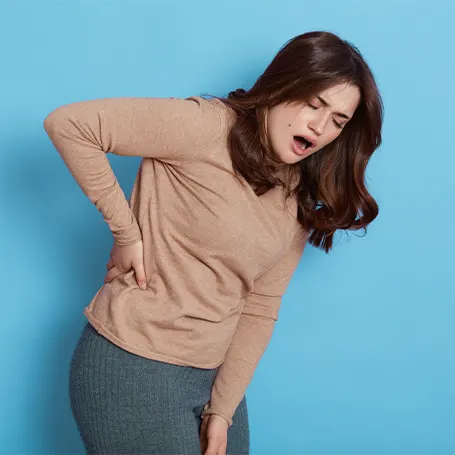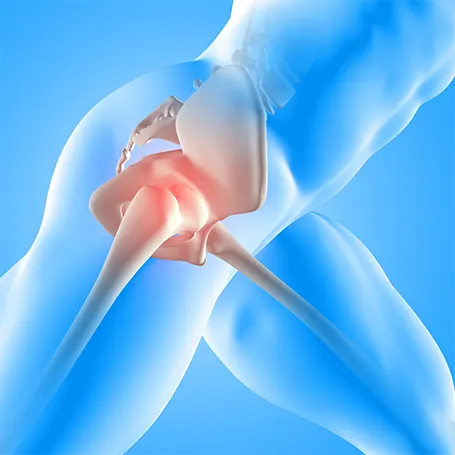How can mattresses cause hip pain?

The most logical place to start this conversation is to list out all of the ways in which your mattress could potentially cause hip pain.
We're first going to go over all of the most common suspects. This means pain caused by your sleeping position or your mattress and not an underlying condition.
And there are quite a few things to talk about in this section! So, let's go over them one by one and then we can get into a few ways that you could potentially remedy your hip pain.
And just to reemphasise, this is general advice and seeing a professional will always be your best course of action. So, while we've done our research and one of these factors could be causing your hip pain, don't take it as a sign to skip out on a doctor's visit.
But enough of pretense, let's get into the specifics!
The mattress is too firm
Potentially the most obvious cause of your hip pain is a firm mattress. Or, to be more specific, a mattress that is too firm for you. While having a soft mattress might sound like the ideal mattress for a lot of people, firm mattresses are right for some people.
And this all comes down to your sleeping position and your weight. As far as your sleeping position is concerned, a firm mattress is mostly problematic if you sleep on your side. This is because side sleepers have their entire body weight resting on their hip and shoulder. And, if the mattress is too firm, these two pressure points can be overworked, causing hip pain.
This is why side sleepers are generally advised to get a slightly softer mattress. For example, a memory foam mattress will let your hip sink into the sleeping surface a bit, spreading out the pressure on your hip. But we'll talk more about pressure relief and sleeping positions a bit later on.
The mattress is too soft
On the opposite side of the spectrum, your mattress can be too soft. And just like in the previous example, this mostly boils down to your sleeping position and your body weight. However, this time it targets back and stomach sleepers. So, no sleep position is safe.
Basically, if you sleep on your stomach or back, your mattress needs to hold up your hips. Otherwise, they'll sink into the mattress and make it so that you're slightly bent over. This then in turn puts a lot of pressure on your lower back and hip joints.
So, once again, your pressure points have to do a lot of lifting. With that being said, a mattress that is too soft is more likely to cause lower back pain than hip pain due to how your spine is curved. So, if you're experiencing hip pain and sleep on your stomach/back, it could be caused by something else entirely.
The mattress isn't supportive
While it can be difficult to describe exactly what a supportive mattress is, there are a few good features to look out for. Most importantly, pressure relief. This is why memory foam mattresses are so popular! After all, memory foam spread out some of the pressure and can relieve hip pain to an extent.
However, that doesn't mean that spring models are completely out of the question. Higher-end pocket spring mattresses are arguably just as supportive. This is because the springs can move independently from one another and respond to your movements throughout the night.
And if you want your new mattress to have it all, a hybrid mattress could be your best bet. In other words, the only mattress type we'd suggest you maybe avoid is innerspring mattresses. While not every innerspring mattress is a bad mattress, they can be less supportive than other models. And since a good mattress also leads to good sleep quality, we'd say it's worth getting the best one you can.
The mattress is too old
In an ideal world, your new mattress would last forever. But in the real world, wear and tear is bound to take hold after a few years. And while it can seem like it's never the perfect time to get a new mattress, you have to get around to it eventually.
That's because wear and tear can completely ruin a mattress and, indirectly, cause hip pain. For example, foam mattresses tend to get lumpy. And a sagging mattress isn't going to help you relieve pain in the same way a new one will. In fact, it might even cause it!
And if the springs have lost their ability to bounce back, they can't prevent hip pain or support your body properly. So, no matter how you slice it, your lumbar spine, and hip joint are going to suffer if your mattress is older than 6-7 years. If so, try to get rid of your old mattress and go for a new one.
Which mattress type can help relieve hip pain?

Now that we've gone over how your current mattress might cause hip pain, let's go in the opposite direction. If you were to get a new mattress, which type can help alleviate the hip pain caused by its predecessor?
Mostly, it comes down to getting the firmness right. However, there are a few other features that can help or hinder your recovery.
So, we're going to go over the most popular and common mattress types and see how each one can help or hinder your recovery. Mind you, however, that we're talking about general trends and not 100% proof distinctions.
For example, just because we think that memory foam can help with certain pains, it doesn't mean that every memory foam mattress is necessarily going to help. So, make sure to do a little extra research before comitting to buying a new mattress to tackle your hip pain.
Memory foam mattresses
When it comes to getting a restful night's sleep, memory foam mattresses are a go-to for many people. After all, who doesn't want to be hugged the entire night? And when asked “Can a mattress cause hip pain”, the person rarely thinks of memory foam mattresses.
And that's because memory foam is generally very soft and offers plenty of pressure relief. This is why even a single memory foam layer can turn a somewhat uncomfortable mattress into one's sleep haven. So, most of the time, a memory foam mattress can be a solid choice. And we say most of the time since, statistically, most people sleep on their side. However, as we've discussed, back and stomach sleepers might need a firmer mattress. Sure, there are also firm mattresses that use high-density foam but they're a bit more rare than their plushy counterparts.
Spring mattresses
When it comes to spring mattress models, the main thing you want to look for among the mattress features are the spring count and the spring type. After all, the springs are going to be doing all of the heavy lifting and ensuring a healthy spine alignment.
So, generally speaking, the more springs the better. And if we're talking about pocket springs, even better. This is because they excel at adaptable support. However, as we've mentioned, make sure that it's not too firm if you plan to sleep on your side.
While getting a medium-firm spring mattress is rather simple, you should still double-check. After all, even if a mattress is targeted as “ideal for a bad back” that doesn't mean it will help you with hip pain. In fact, if you sleep on your side on a mattress that is too firm, it's more likely the mattress will cause or worsen your hip pain.
Hybrid mattresses
For some people, a hybrid mattress can feel like a happy medium between the previous two. Since it still has foam layers, you're getting pressure relief. And since a hybrid mattress also typically has pocket springs, your body can be fully supported.
And, if you experience hip pain every night, this could be the most surefire way to deal with the problem. However, we would like to draw your attention to two important factors. Firstly, keep in mind that hybrid mattresses can be a lot more expensive than your average spring or memory foam mattress.
Secondly, everything we've said so far still applies. So, just because it's a hybrid mattress doesn't mean that you can overlook the firmness scale or your sleeping position. And, of course, if it's a chronic pain, you should probably get it checked out by a professional. In other words, a hybrid mattress won't magically fix any issue. Although it might help get a good night's rest.
Latex mattresses
Lastly, we'd like to look at a latex mattress. And this is because latex has most of the same benefits as memory foam while also avoiding some of the downfalls. For one, a latex mattress is going to provide a very similar hugging sensation as memory foam. And, by doing so, relieve pressure off your hip flexor and/or lower back.
Secondly, latex is usually firmer and can offer more adequate support than memory foam. And this is rather significant if you sleep on your stomach or back and don't need a medium soft or soft model. So, if you like memory foam but need something slightly firmer than medium-firm, a latex mattress could be the way to go.
What can cause hip pain?

Since we've covered how a mattress can cause hip pain, we'd like to briefly go over a few medical conditions that can do the same thing. Again, this is just for informational purposes and in no way an invitation to self-diagnose. But according to the Cleveland Clinic, here are some of the conditions that can cause hip pain:
- Osteoarthritis.
- Rheumatoid arthritis.
- Ankylosing spondylitis
- Iliopectineal bursitis.
- Trochanteric bursitis
- Structural conditions
- Injuries
And when it comes to these conditions, even the best mattress can't solve the problem. It might help at alleviating pressure but it's by no means the final solution. So, in the following section, keep in mind that these conditions will always require the advice of a professional.
How can you alleviate hip pain?

Now that we know that a mattress can cause hip pain, let's talk about a few remedies. As we've done up until this point, we're going to mainly focus on hip pain caused by a faulty mattress and not medical conditions.
However, some of the tips could be applicable to both situations. Just make sure that your doctor knows what you're up to.
First, we're going to focus on a few purchases that can help you alleviate hip pain in the long run. In other words, bedding items that can potentially stop your hip pain from worsening or coming back in the future. If you've paid attention to the previous segments, this part should be rather simple and straightforward.
And then we're going to cover an actual recovery technique. This is for situations where your hip already aches and you want a way to dull the pain. So, a short-term solution.
Hopefully, if you take both the long and short-term solutions into mind, and talk to your doctor, you should be golden.
Getting a new mattress
Of course, the best way to deal with a pain-causing mattress is to simply throw it out and get a new one. After all, if it has been a few years, your current mattress can no longer provide adequate support and it's in your best interest to replace it. And if you're having trouble choosing a mattress, we recommend following our guide on the topic.
But the most important thing to get right is the firmness. We've already talked about this topic quite a few times, so, we're not going to linger on it too much.
Get an adjustable bed frame
In a similar vein, you can opt for a new bed frame. Adjustable beds, as the name implies, allow you to control and personalise the bed frame to a degree. This usually means changing the elevation of the front or back of the bed frame. And these changes in elevation can in turn help with some health issues.
This is why most hospitals use adjustable beds! From acid reflux to lower back pain, sleeping at a slight incline could make going to sleep a lot easier. That being said, if you typically fall asleep on your side, it can be a bit more awkward to get the angle right. After all, you don't want your spine to be bent.
Plus, adjustable beds can cause some joint pain if not set up properly! So, we'd highly recommend talking to a professional before investing in an adjustable bed. Especially since they're usually not cheap.
Get a mattress topper
If getting a new mattress or an adjustable bed frame is a bit outside of your budget, a mattress topper could be the ideal alternative. This is because mattress toppers can make up for some of the faults of your current mattress. For example, if your mattress is a bit too firm, a memory foam mattress topper could add that little bit of cushioning your hips need to stay pain-free.
However, do note that a mattress topper has its limits. So, while it can cover up some minor issues, it can't turn a 10-year-old mattress into a brand-new one. Therefore, when choosing your mattress topper, keep in mind that you still need at least a somewhat decent mattress to go with it.
The RICE method
Lastly, when it actually comes to relieving hip pain, here are a few things you can try out. It's called the RICE method so that it's easier to remember, with each letter being one of the steps. So, let's briefly go over all of them.
Rest
When it comes to any kind of injury, physical activity can potentially make the pain worse or deepen the issue at hand. Of course, this is especially true if the affected body part is active in some way. And when it comes to hip injuries, even walking around can potentially cause discomfort.
So, to the best of your ability, try to get some rest. We recommend getting as comfortable as you can and trying to stay home for a bit. You could potentially do some light stretching but try to avoid putting pressure on your hips.
Ice
We've all gotten hurt when we were little and had our parents apply an ice pack to our brand-new bruises. Well, this is still a valuable relief strategy regardless of your age! The only thing to keep in mind is that you don't want to apply the ice directly to the skin. So, wrap it in a towel or something else to act like a buffer.
It's recommended to keep the ice on for 10-15 minutes every hour. At least during the first day. This is to help with some of the inflammation and swelling. And if you don't have an ice pack, some frozen vegetables will do the trick.
Compression
Putting a bit of pressure on or around the affected area can also help with some of the swelling. You can use a compression wrap or even wear compression shorts to get the effect. It's also ideal if a professional applies the wrap, just so that you know you're not putting too much pressure on the hip itself.
Elevation
Like we've said when talking about the adjustable bed, a change in elevation can help out quite a bit. However, in this case, it's a bit different. Some professionals recommend lifting your lower body so that it's above the level of your heart. You can do this by stacking blankets or pillows underneath your lower back and legs.
Physical therapy and/or hip surgery
While lifestyle changes can prevent hip pain from occurring again in the future and the RICE method can dampen the discomfort, sometimes you need professional help. Whether it be in the form of physical therapy, surgery, or both, this is bound to be the most surefire way to get rid of your hip pain.
So, even though we've left it for the end of this article, it should be your number one choice. At the very least, you should have a doctor take a look so that they can determine whether your condition is serious or not.
Conclusion
Overall, can mattresses cause hip pain? Yes. If the mattress is too soft or too firm, your hip could end up under a lot of pressure and cause aches. However, other factors could be at play as well. So, make sure you run it by your doctor and hopefully, a new mattress or topper will save the day! But do let us know in the comments whether you've ever experienced hip pain and how you dealt with that issue.
Spread the word
Related products:
- Silentnight Geltex Ultra 3000 Mattress Review
- Rest Assured 2000 Pocket Sprung Mattress Review
- Luna Memory 1000 Pocket Mattress Review















There are no comments yet
"*" indicates required fields